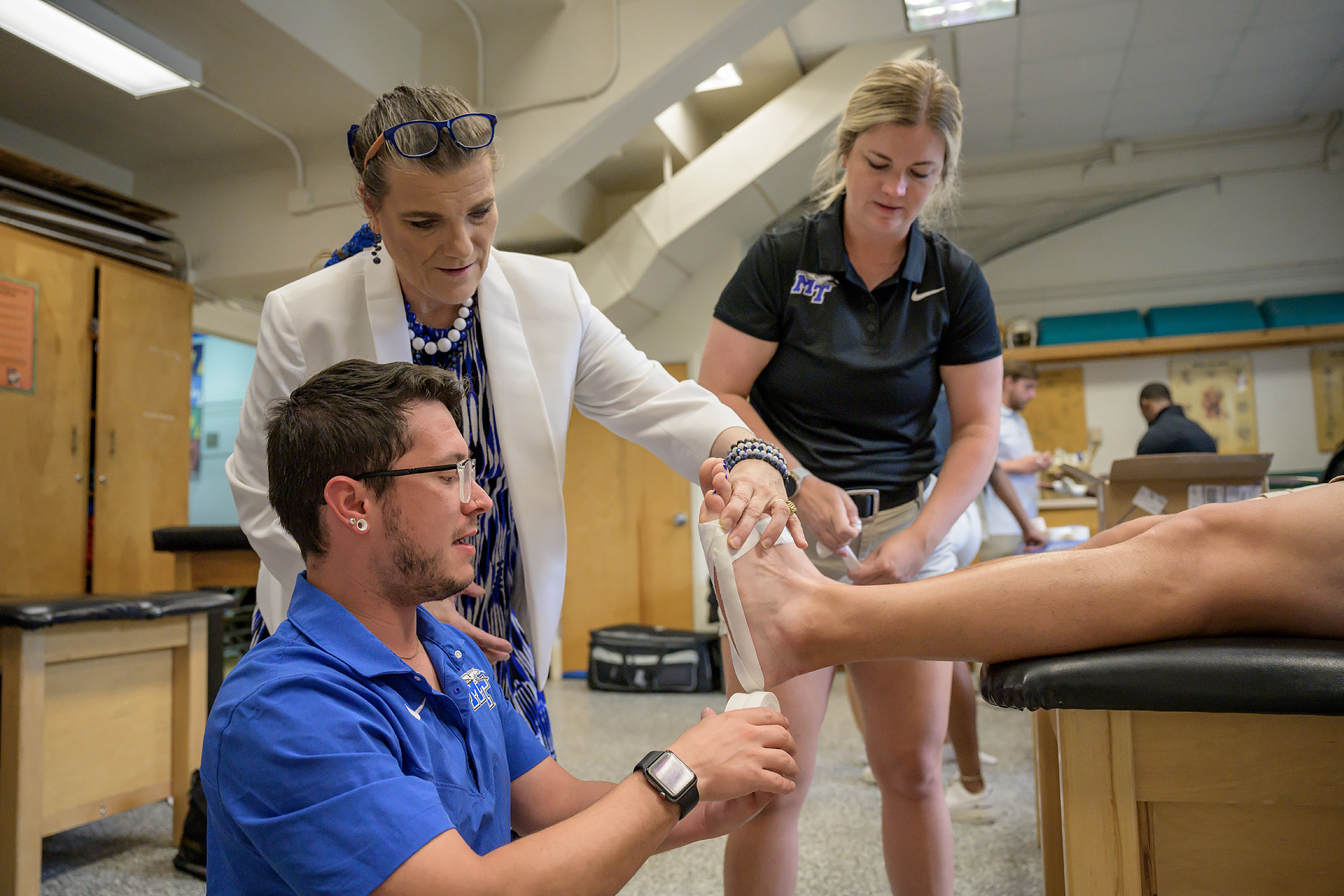
Athletic Training
Hands-on clinical training where Certified Athletic Trainers learn injury care, rehab, and nutrition, under supervision.
Athletic Training, M.S.
Hands-on, clinical education experiences form a key component of the master's of athletic trainer degree program.
Athletic Trainers are certified healthcare providers who impart knowledge and skill to address the many facets of athletic activity, from preventing, treating, and assessing injuries to facilitating rehabilitation and return to activity, along with counseling on proper nutrition and general health, fitness, and wellness. Students learn under the direct supervision of an athletic trainer and have opportunities for a variety of clinical experiences, like working with athletic trainers for area high school and college teams to summer experiences with professional sports franchises such as the Tennessee Titans, the Tampa Bay Buccaneers, and the Arizona Cardinals.
Students interact with other allied health professionals such as physical therapists, physician assistants, and nurse practitioners; they also have opportunities to interface with physicians. While other university programs offer two years of clinical experience, MTSU's program offers three years to better train students for the real world.
News Briefs
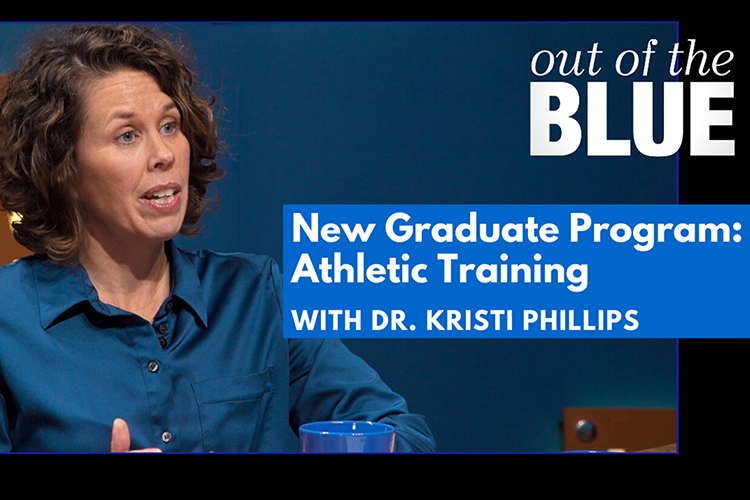
‘Out of the Blue’ showcases how athletic training degree is ‘leveling up’ to graduate program [VIDEO]
Kristi Phillips, coordinator of MTSU’s new Master of Athletic Training Program launching this summer, spoke on this month’s “Out of the Blue” episode about the program’s transition to an advanced degree in keeping with nationwide trends of peer health care professions requiring a graduate-level degree. “Everything (like occupational and physical therapy) is trending in the direction of master’s and [ Read More ]
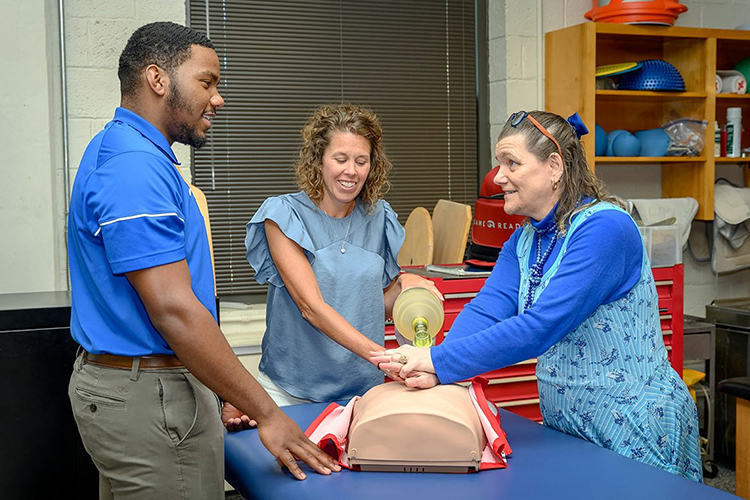
New MTSU Master of Athletic Training program launching this summer
MTSU professor Helen Binkley along with master instructor Kristi Phillips were committed to transitioning their high-quality undergraduate degree program in Athletic Training to a master’s when new industry accreditation requirements loomed. “Our options were either to teach out the undergraduate program until the last chance possible before discontinuing AT altogether or take the steps required to move our program to the [ Read More ]
News Briefs

‘Out of the Blue’ showcases how athletic training degree is ‘leveling up’ to graduate program [VIDEO]
Kristi Phillips, coordinator of MTSU’s new Master of Athletic Training Program launching this summer, spoke on this month’s “Out of the Blue” episode about the program’s transition to an advanced degree in keeping with nationwide trends of peer health care professions requiring a graduate-level degree. “Everything (like occupational and physical therapy) is trending in the direction of master’s and [ Read More ]

New MTSU Master of Athletic Training program launching this summer
MTSU professor Helen Binkley along with master instructor Kristi Phillips were committed to transitioning their high-quality undergraduate degree program in Athletic Training to a master’s when new industry accreditation requirements loomed. “Our options were either to teach out the undergraduate program until the last chance possible before discontinuing AT altogether or take the steps required to move our program to the [ Read More ]
Related Media

Athletic Training, M.S.
Athletic Trainer Degree Careers
Athletic trainers can find careers within a variety of organizations, from professional sports organizations to corporations interested in employee wellness to hospitals and rehabilitation clinics. Examples include:
- Administrator
- Athletic trainer (high school, college, or professional settings)
- Corporate fitness and wellness
- College/University educators and preceptors
- Emergency room sports medicine liaison
- Industrial safety, injury prevention and ergonomics specialist
- Military and tactical prevention, training and rehabilitation specialist
- Performing arts athletic trainer
- Physician extender
- Surgical and casting technologist
Employers of MTSU Athletic Trainer degree alumni include, but are not limited to:
- Arizona Cardinals
- Athletico Physical Therapy- clinic outreach, Mississippi
- ATI Physical Therapy - clinic outreach
- Auburn University
- Battleground Academy
- Benchmark Physical Therapy - clinic outreach
- California State University, Fullerton
- Campbell Clinic
- Columbia County Schools, Georgia
- Covenant Health - clinic outreach
- Doctors Hospital - clinic outreach, Georgia
- East Carolina University
- East Tennessee State University
- Eastern Kentucky University
- Elite Sports Medicine
- FedEx - Operations Safety Specialist
- Florida International University
- Frito-Lay
- Hamilton Medical Center, Georgia
- Gulf Orthopaedics and Infirmary Health, Alabama
- IMG Academy Sports Camps, Florida
- Knoxville Orthopedics
- Liberty University
- Lipscomb Academy
- Lipscomb University
- Maury Regional Medical Center
- Maury County Public Schools
- Middle Tennessee State University
- Montgomery Bell Academy
- Northside Hospital Orthopedic Institute and Sports Medicine, Georgia
- OrthoOne Sports medicine - clinic outreach
- Pilot Onsite Innovations - clinic outreach
- Prism Hospital System, South Carolina
- Progressive Health
- Rutherford County Schools, Tennessee
- Samford University
- Source Fitness Management - clinic outreach
- Southern Tennessee Medical Center
- Sumner County Schools, Tennessee
- STAR Physical Therapy - clinic outreach
- Tennessee Orthopedic Alliance
- Tennessee State University
- Trevecca Nazarene University
- Trousdale County Schools, Tennessee
- University of Oklahoma
- Vanderbilt School of Medicine
- Vanderbilt Sports Medicine
- Vanderbilt University Medical Center
- 351st Special Warfare Training Squadron at the Pararescue and Combat Rescue Officer Schoolhouse
Athletic Training students are encouraged to join MTSU's Student Athletic Trainer Association (SATA). The purpose of SATA is to promote interest in athletic training, educate the members on relative subjects in sports medicine, engage in community outreach and volunteer activities, and to network with professional practitioners and organizations. Click here for more information.
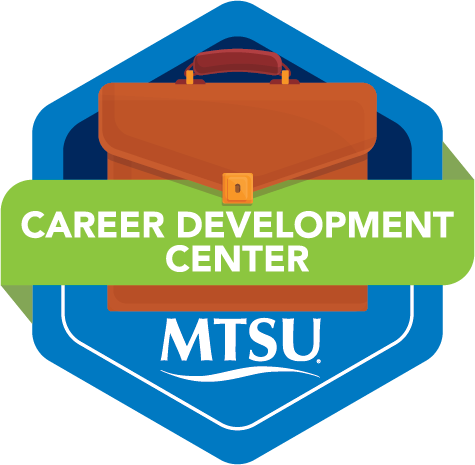
MTSU’s Career Development Center
MTSU offers a comprehensive Career Development Center that serves students throughout the full student experience and beyond. They collaborate with faculty and staff to equip students with the tools to be marketable to the world of work and continuing education.
Students can schedule an appointment or check online resources and job boards at mtsu.edu/career.
Students can find current internship opportunities by talking to faculty and visiting the University job and internship board called Handshake.
Wondering what you can do with your major? Check out our What Can I Do with A Major In guides.



Professional Licensure Disclosure
The Master of Science in Athletic Training (MS Athletic Training) in the College of Behavioral and Health Sciences is accredited by the Commission on Accreditation of Athletic Training Education (CAATE). Admission to the MS Athletic Training does not guarantee that students will pass the Board of Certification Exam (BOC Exam) or obtain an athletic trainer license. Successful completion of the 72-semester hour MS Athletic Training meets the educational requirements and qualifies students to sit for the BOC Exam and apply for licensure in Tennessee.
Licensing authorities for each state set and enforce their own requirements and standards, which are subject to change. The MS Athletic Training disclosure provided on MTSU’s professional licensure disclosure website indicates the states and territories where MTSU has determined, through reasonable and good faith effort, that the program does or does not meet the educational requirements for other US states and territories. Current and prospective students not located in Tennessee or who plan to seek licensure or certification outside the state of Tennessee should contact the appropriate state licensing agency or board and discuss their plans with an advisor before enrolling in the program to ensure they have the most up-to-date information and guidance regarding licensure requirements.
Athletic Trainer Degree Plan and Maps
Athletic Trainer Degree Program Manuals
Forms and Other Documents
- Technical Standards
- Student Guide for Recommendations
- Recommendation Evaluation Form
- Medical Examination & Physical Form
- Student Liability Insurance
- Observation Hours Verification Form
Clinical Competencies Grid-sheets
- ATHT 5000
- ATHT 5200
- ATHT 6100
- ATHT 6110
- ATHT 6120
- ATHT 6130
- ATHT 6140
- ATHT 6200
- ATHT 6430
- ATHT 6820
- ATHT 6970
Clinical Integrated Competency Sheets
Professional Organizations
The Athletic Training Program at Middle Tennessee State University is currently accredited by the Commission on Accreditation of Athletic Training Education (CAATE). The Athletic Training Program has been accredited since 2002.
Middle Tennessee State University is currently accredited by the CAATE.
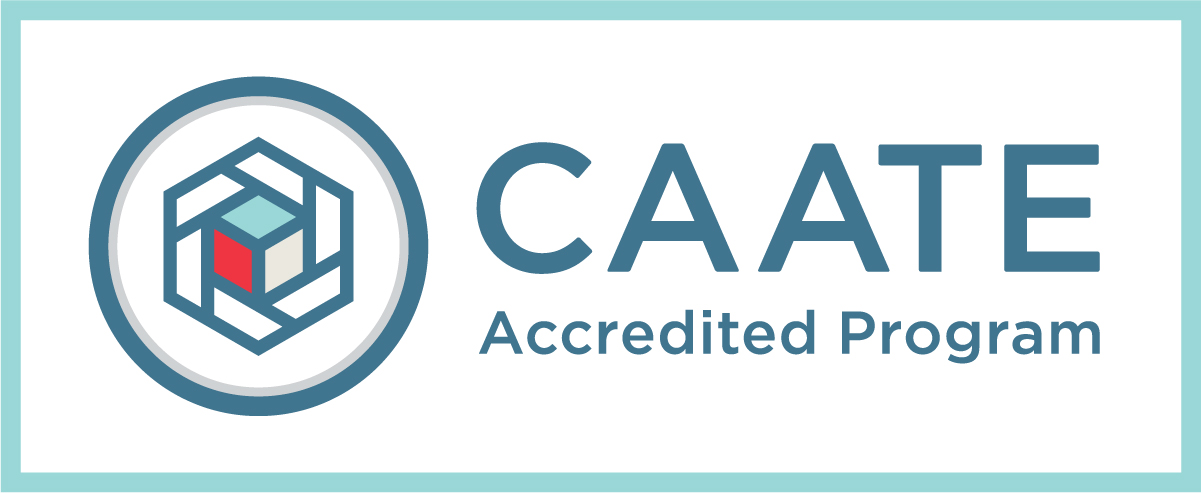
Master's of Athletic Training Transfer Policy
The Master of Science in Athletic Training Program will typically not accept transfer of credits. Students wishing to be considered for transfer credit should contact the Program Director. If transfer credit is accepted, a student must pass a knowledge and skills test over the course work previously attempted and be approved the athletic training advisory board.
Mission Statement
The mission of the Athletic Training Program (AT Program) is to produce exceptional professionals who will be contributing members to the profession of athletic training, and who possess the knowledge, skills and abilities to become proficient in the prevention, diagnosis, treatment, rehabilitation, and administration of injuries and illnesses for the physically active. A broad-based comprehensive blend of academic (didactic course work, laboratories, and hands-on learning session), clinical and professional experiences in a student-centered environment that incorporates the most recent research and technologies to meet the challenging needs of a dynamic health care environment is offered.
The AT Program promotes the mission of the Health and Human Performance Department, College of Health and Behavioral Sciences, and Middle Tennessee State University through scholarship, research, and service. Designed to meet the accreditation standards established by the Commission on Accreditation of Athletic Training Education (CAATE), the AT Program, prepares students for the Board of Certification (BOC) examination. An AT Program graduate is prepared to complete graduate study in athletic training and related fields, serve the healthcare needs of the physically active, navigate a global society, be culturally competent, demonstrate legal and ethical medical practice, and display professionalism within their academics and career. Middle Tennessee State University AT Program is committed to providing a quality learning atmosphere for students pursuing athletic training regardless of race, gender, religion, national origin, disability or veteran status.
Vision Statement
The AT Program strives to become one of the leading athletic training programs in the nation and a premiere program in the southeast region and state of Tennessee. Middle Tennessee State University AT Program will produce highly qualified students for entry into the profession of athletic training.
Program Goals and Objectives
Middle Tennessee State University AT Program prepares students to become well-rounded educated individuals through program goals and objectives:
- Acquire the knowledge, skills, abilities, and competencies included in the 2020 standards and guidelines established by The CAATE, approved by The Strategic Alliance (NATA, CAATE, BOC, and NATA Foundation), while preparing students to sit for the BOC for Athletic Training to become a professional athletic trainer.
- Promote students to think logically, critically, and creatively, and to make sound judgement and decisions in a supervised environment, under qualified faculty, medical, and health care professionals.
- Ensure quality clinical experiences that allow students to appreciate the role of an athletic trainer in a variety of practice settings with diverse patients and clients in athletics, work, and life.
- Promote effective communication techniques and strategies to build positive professional relationships with patients, administrators, other healthcare providers, and the public.
- Prepare students to acquire and integrate research into daily clinical practice through the practice of evidence-based medicine.
- Promote professionalism and the importance of ethical practice.
- Encourage active engagement in university, community, and professional activities that develop leadership and role-modeling skills while sharing knowledge, expertise, and creative activities.
- Prepare qualified healthcare professionals to successfully gain employment (in colleges, high schools, professional sports, sports medicine clinics, and other athletic training/sports medicine agencies) or continue on to post-professional education.
Program Student Learning Outcomes
The AT Program has specific student learning outcomes based on the expectations of Middle Tennessee State University and the Department of Health and Human Performance. Students will be able to:
- Demonstrate effective communication, both orally and in writing.
- Demonstrate discipline-specific content knowledge.
- Analyze and think logically, critically, and creatively to make sound judgments in problem-solving situations.
- Demonstrate knowledge of diverse cultural needs and abilities.
- Apply professional skills and research in discipline-specific situations.
- Value lifelong learning through professional advocacy and participation.
- Demonstrate knowledge of ethical practice.
The AT Program has several program specific outcomes. The AT Program will:
- Assemble and maintain high quality faculty, medical, and health care professionals as supervisors and preceptors in the AT Program.
- Arrange and select a variety of clinical sites and practice settings with diverse patients and clients in athletics, work, and life.
- Collect and assess information on employment and/or post-professional education placements in athletic training.
- Evaluate the overall effectiveness and student satisfaction of the AT Program.
- Report and evaluate BOC pass rates.
- Report and measure graduation and retention rates in the AT Program.
What Does it Cost?
Athletic Trainer Degree Program Costs
Athletic training students pay the same fee schedules as do all other undergraduate students at the University. These fees are described in detail elsewhere in this catalog. Additional expenses incurred by athletic training students include:
- The cost of a uniform package – approximately $100-150;
- Liability insurance - approximately $35 (yearly);
- Membership into the National Athletic Trainer's Association – approximately $80-100 (yearly);
- Maintenance of professional rescuer CPR- approximately $30-50 (yearly);
- Verification of immunization (cost depends on where immunization is received);
- Their own transportation to and from clinical sites including, but not limited to, vehicle and fuel costs.
- The cost of a background check, if required by the clinical site – approximately $40 (when required by clinical site).
Clinical sites (for clinicals, practicums, and immersive experiences) may be assigned to a student within a 60-mile radius of the MTSU main campus. Students are required to have a minimum of five off-campus clinical rotations, with a maximum of nine off-campus clinical rotations, to complete the clinical component of the Athletic Training Program. There may be some immersive experiences that are beyond the 60-mile radius of campus set-up by the program to meet the needs of the student, the experiential requirements, and the clinical site availability.
For more information about the Athletic Training program, you may contact: Dr. Helen Binkley, Department of HHP, MTSU, Box 96, Murfreesboro, TN 37132. (615) 904-8192 or [email protected].

CONTACT US













